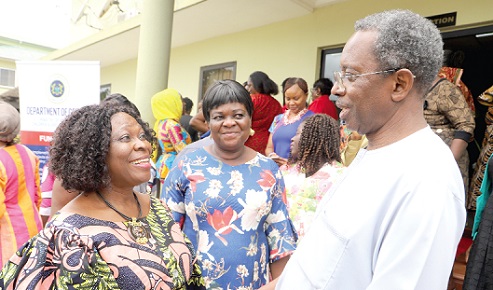
Toolkit for men to promote women empowerment
The Department of Gender under the Ministry of Gender, Children and Social Protection is developing a national framework and toolkit that will help in the engagement of men and boys in gender equality programming and interventions in the country.
The framework and toolkit are set to galvanise the support needed for Ghanaian men to be agents of change in promoting gender equality and women empowerment.
Advertisement
The consultant developing the framework and toolkit, Samuel Essah, in a presentation said there was an increasing recognition of the need to build programme approaches and strategies to support the active participation of adolescent boys and young men as beneficiaries of and stakeholders in gender equality.
The framework and toolkit, he said, would help identify a multi-level that was national, community and individual interventions and engagements with men and boys which were expected to collectively generate an enabling environment to address reproductive health and social issues affecting women and girls, as well as reducing their vulnerabilities.
Gender equality
The Director of the Ghana Productive Safety Net Project (GPSNP) of the ministry, Mawutor Ablorh, on behalf of the Minister designate for Gender, Children And Social Protection, Hajia Lariba Zuweira Abudu, said gender equality benefited everyone and therefore to accelerate progress on gender equality as a country, a collective effort from stakeholders, champions, supporters and collaborators was required.
He said over the years, the quest for gender equality had seen women and girls leading the charge but the time had come for men and boys to be exposed to the crucial role they had to play in achieving the gender equality and women empowerment agenda.
“That is to say, we cannot leave men and boys behind when it comes to gender equality,” he added.
Gender norms
The United Nations Population Fund (UNFPA) Country Director, Barnabas Yisa, said research with men and boys and the concept of patriarchy had shown how inequitable gender norms influenced how men interacted with their partners, families and children on issues, including contraceptive use, physical violence against both women and men, domestic chores, parenting and even the health-seeking behaviours of men themselves.
Therefore, he said developing a national framework and toolkit, on how to engage men and boys on such negative gender norms, were timely and would help to ensure, “our concerted efforts are yielding the desired results”.
He said against the backdrop of increased reports of sexual and gender-based violence, harmful cultural practices such as child marriage and female genital mutilation, as well as alarming rates of adolescent pregnancies due to the after effects of the COVID-19 pandemic, the role of men and boys in resolving those social issues was pivotal and could not be overemphasised.
The Deputy Director, Department of Gender, Vera Kakari Bediako, in a welcome address on behalf of the Chief Director, Dr Afisah Zakariah, said gender norms were highly personal for people and was deeply embedded in societies and the day to day lives of people.
“We can be heavily invested in these norms, as our sense of identity and social status can be closely tied up to them,” she said.
Therefore, she said challenging gender norms could be difficult and could present a range of barriers which needed to be overcome in societies.
Writer’s email:[email protected]




